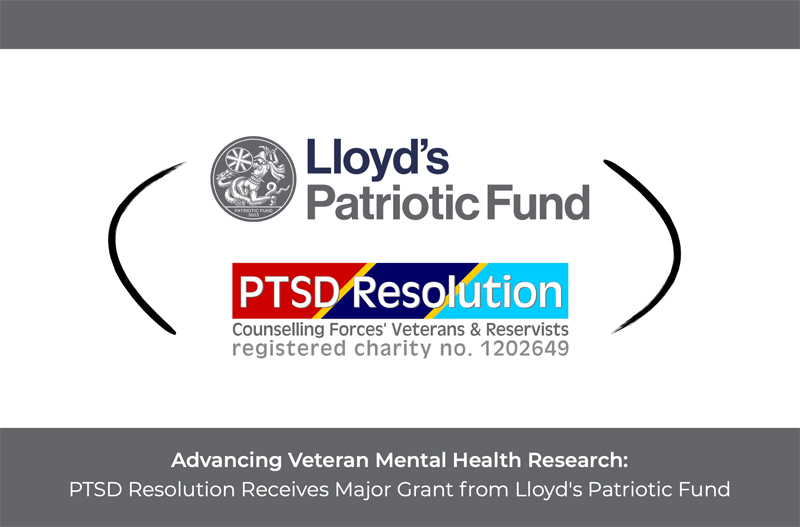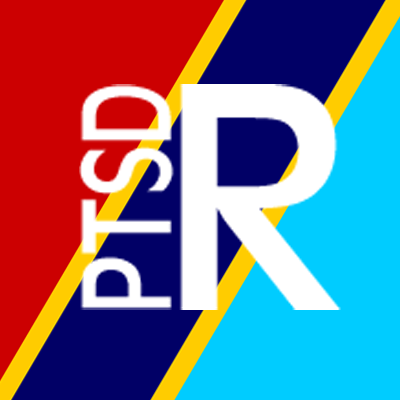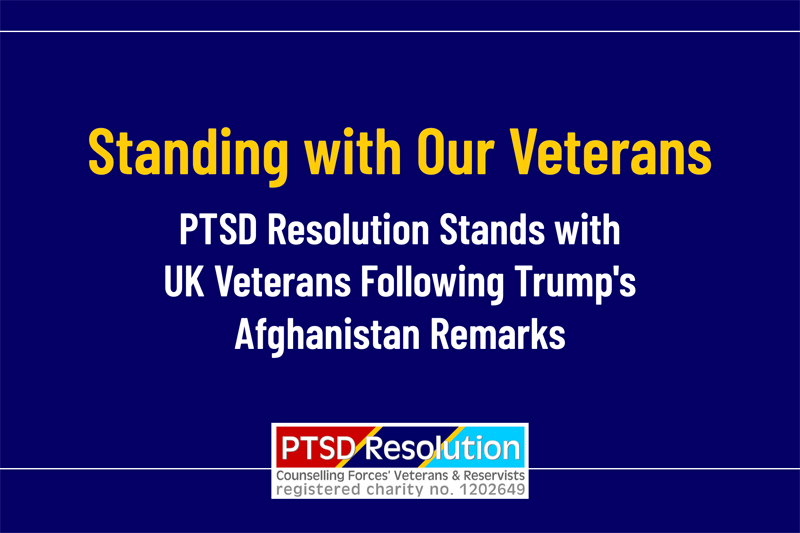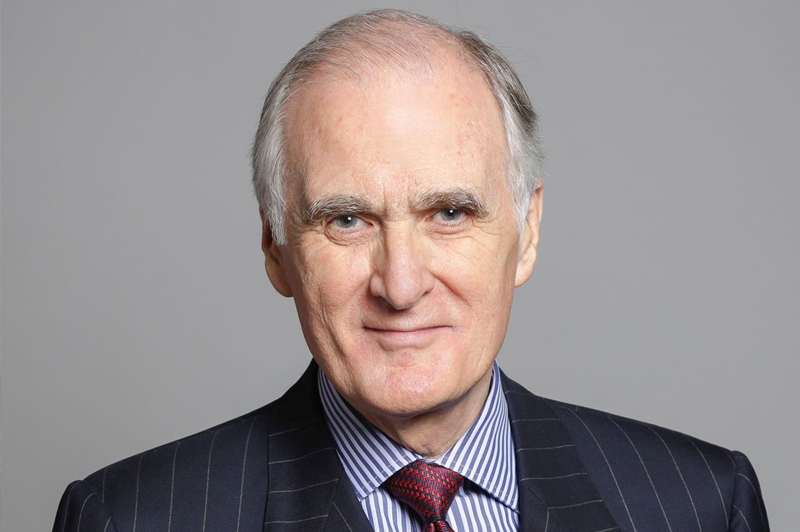PTSD Resolution Receives Major Grant from Lloyd's Patriotic Fund
ID: 081025

PTSD Resolution (PTSDR) has been awarded a two-year grant of £60,500 from the Lloyd's Patriotic Fund (LPF) to conduct groundbreaking research into the early identification and treatment of Complex Post-Traumatic Stress Disorder (C-PTSD) among UK veterans. This funding will support "Project ITQ," a comprehensive real-world evidence study utilising the International Trauma Questionnaire to enhance understanding of complex trauma and improve treatment outcomes within the veteran community.
A Partnership Rooted in Shared Purpose
The collaboration between PTSD Resolution and the Lloyd's Patriotic Fund represents a meeting of minds between two organisations deeply committed to supporting those who have served their country. Founded in 1803, Lloyd's Patriotic Fund stands as the oldest military charity of its kind, having united the Lloyd's insurance market for over two centuries in service of veterans and their families. This partnership reflects a shared focus on mental health and reintegration support.
LPF's objects encompass the relief of mental sickness, including PTSD, amongst UK armed forces veterans and their families through counselling, psychotherapeutic treatment, and social support. Their commitment extends to promoting research into treating post-traumatic symptoms, advancing public education about PTSD, and promoting social inclusion, goals that complement the charity's established mission.<br>
The Significance of Project ITQ
Project ITQ represents a crucial advancement in understanding and treating complex trauma within the veteran population. The research will employ the International Trauma Questionnaire (ITQ), a validated assessment tool designed to identify both PTSD and C-PTSD—conditions that, whilst related, require different therapeutic approaches and have distinct clinical presentations.
C-PTSD encompasses not only the core symptoms of PTSD—re-experiencing, avoidance, and hypervigilance—but also includes additional features of emotional dysregulation, negative self-concept, and interpersonal difficulties. These additional symptoms often result from prolonged or repeated trauma and can significantly impact an individual's ability to function in daily life, maintain relationships, and successfully transition to civilian employment.
The two-year study will assess approximately 430 clients in its first year, using the ITQ protocol to identify probable C-PTSD at intake and evaluate the effectiveness of targeted interventions. This represents one of the largest real-world studies of its kind, providing crucial data on the prevalence of complex trauma amongst veterans seeking mental health support and the effectiveness of community-based treatment approaches.
Real-World Evidence and Clinical Practice
What distinguishes Project ITQ is its emphasis on real-world evidence gathered from everyday clinical practice rather than controlled laboratory conditions. PTSDR's approach reflects genuine treatment scenarios within community-based, non-residential settings—providing insights that are both practical and immediately applicable to service delivery across the veteran mental health sector.
Clinical change will be monitored using ITQ assessments at therapy intake and conclusion, providing research-informed insights into symptom reduction. Whilst the ITQ is not formally designated as an outcome measure, its systematic application offers valuable insights into treatment interventions and effectiveness, particularly amongst clients presenting with highly complex trauma histories.
This methodology aligns with PTSDR's commitment to transparency and accountability. This model, which delivers an average cost of £940 per course of treatment through its network of 200 Human Givens therapists nationwide, demonstrates that effective mental health support can be both accessible and resource-efficient without compromising on quality.
Addressing Critical Gaps in Veteran Mental Health
The research addresses several critical gaps in current understanding of veteran mental health. Firstly, it will provide robust data on the prevalence of C-PTSD within the veteran population, information that is currently limited but essential for service planning and resource allocation. Secondly, it will evaluate how early identification of complex trauma impacts treatment outcomes, potentially revolutionising how mental health services are delivered to this vulnerable population.
The project's focus on cost-effective delivery is particularly significant given current pressures on mental health services. By demonstrating that effective treatment can be delivered through scalable, community-based models, the research may inform commissioning decisions and policy development across the broader healthcare system.
Innovation in Treatment Delivery
PTSDR's approach through Human Givens therapy offers a distinctive model of care that emphasises meeting fundamental human needs for security, autonomy, connection, and meaning. This therapeutic framework, delivered through the charity's nationwide network, provides a replicable model that can be adapted to various settings whilst maintaining consistent standards of care.
PTSDR's lean operational model—with no salaried staff or fixed assets—ensures that 92% of funds go directly towards charitable objectives. This efficiency, combined with the average treatment duration of 6.7 sessions, demonstrates that effective mental health intervention need not require extensive infrastructure or prolonged engagement to achieve meaningful outcomes.
Broader Implications for Mental Health Services
The findings from Project ITQ will have implications extending far beyond the organisation's own service delivery. By openly sharing research findings and supporting evidence-led improvements across the veteran mental health sector, the project aims to raise standards and improve outcomes for all veterans seeking support.
The research will contribute to the growing body of evidence supporting community-based treatment models, potentially influencing how mental health services are commissioned and delivered across the NHS and voluntary sector. The emphasis on replicability and scalability addresses key challenges in mental health service provision, particularly the need to deliver effective interventions at scale without compromising quality or accessibility.
Supporting the Most Vulnerable
Significantly, the charity's research will include former service personnel who are often excluded from other studies—those in prison, those with substance misuse issues, and those with complex presentations who may have been unsuccessful with previous treatments. This inclusive approach ensures that research findings reflect the full spectrum of veteran mental health needs and that evidence-based improvements reach the most vulnerable members of the ex-forces population.
The charity's work in prisons, having treated 202 clients across 35 institutions, demonstrates its commitment to reaching former service personnel wherever they may need support. The inclusion of this population in the research will provide valuable insights into the effectiveness of trauma-focused therapy within custodial settings.
Looking Forward
As Project ITQ unfolds over the next two years, it will generate data and insights that could transform understanding of complex trauma amongst veterans. The project's emphasis on real-world evidence, resource efficiency, and scalability positions it to influence policy and practice across the veteran mental health landscape.
The partnership between PTSD Resolution and Lloyd's Patriotic Fund exemplifies how collaboration between established institutions and innovative service providers can drive meaningful advancement in former service personnel care. By combining Lloyd's Patriotic Fund's historical commitment to supporting those who serve with PTSD Resolution's clinical expertise and research capabilities, Project ITQ represents a significant step forward in evidence-based veteran mental health provision.
The ultimate goal extends beyond academic understanding to practical improvement in the lives of veterans and their families. By identifying complex trauma early and tailoring interventions accordingly, the research aims to reduce suffering, improve functioning, and support successful transition to civilian life—outcomes that benefit not only individual veterans but society as a whole.
Through this research, PTSD Resolution continues its mission of providing hope and healing to those who have served their country, whilst contributing to the broader knowledge base that will inform veteran mental health services for years to come. The generous support of Lloyd's Patriotic Fund makes this vital work possible, demonstrating the enduring commitment of both organisations to those who have given so much in service of others.
Contact: www.PTSDresolution.org






